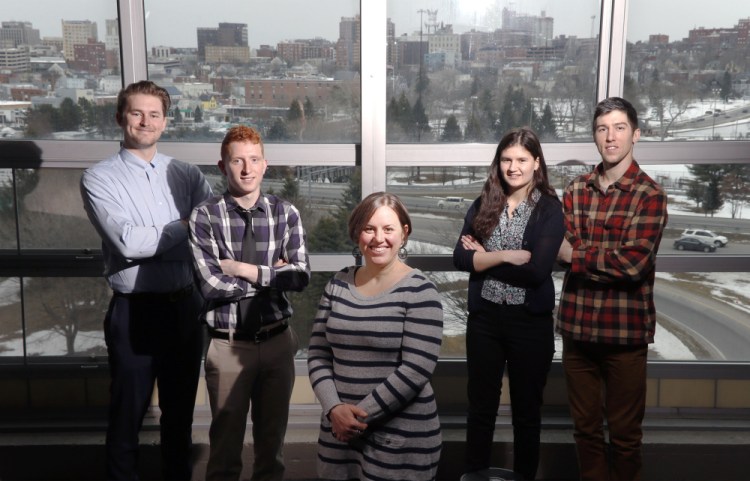EDITOR’S NOTE: Many Source nominations cross categories and could easily be honored in more than one. Such is the case with a new Manomet program called U360, which was nominated for a newcomer award. But after deliberations among the judges, we decided its more profound impact is as a teacher, both to the young people who intern with the program and to the small businesses that benefit from it.
Lora Winslow was hired by Manomet in 2015 to work on a new project the nonprofit organization calls Root360, an initiative designed to help small businesses in Maine and New England focus on a big-picture issue that often gets neglected amid the complexities of running a small business: sustainability.
But a funny thing happened on the way to helping out those small businesses. Winslow figured out how to double the impact of the program by creating a second program, U360, an internship geared toward college students with an interest in sustainability. Manomet, which takes a scientific approach to wide-ranging issues, including sustainable economies, has a longstanding goal of helping businesses work on the triple bottom line (i.e., profit, people and planet) and it wanted small-business owners to use an online tool kit it had created to help companies evaluate and maintain sustainability. But getting them to participate was a challenge.
“They have constraints on their time and resources,” Winslow said. “And it can be hard to connect with them on things that aren’t directly related to their day-to-day operations.” What if, Winslow wondered, Manomet brought in a few local college students to help with outreach? Sustainability majors are all the rage at institutions of higher learning, but those programs tend to focus their academic studies on how big corporations work on sustainability, to the neglect of small businesses. And good internships with practical applications are hard to come by. If they could earn academic credits as they gained experience and helped Manomet reach more small businesses, what would that look like?
“It’s a win-win-win,” Winslow said.
She floated the idea by some of her contacts at Maine universities (Manomet is based in Plymouth, Massachusetts, but Winslow was hired to work in Manomet’s office in Brunswick). She talked it through with her bosses at Manomet.
“As it started to take shape, it was turning into more of a high-impact internship, as opposed to having them be survey monkeys.”
That advances another of Manomet’s goals: training the next generation to tackle sustainability issues. U360 fit that bill, and it has earned Manomet the 2017 Source Teacher Award.
When the program launched last spring, Winslow had three University of Southern Maine students on board. That summer a student from College of the Atlantic interned with U360. Then, with the help of a $91,000 grant from the Environmental Protection Agency, the program started an explosive expansion, with 17 students enrolled this semester. They’re from USM, the University of New England, the University of New Hampshire and the University of Vermont.
Winslow serves as the interns’ mentor/teacher for the semester. She teaches them about the triple bottom line and the different ways it is applied in small versus big businesses. They talk about climate change, energy, water and chemicals, four areas that affect small businesses. Then she sends them out to find 60 small businesses to take part in the Root360 program. She’s got criteria: some local businesses, some national ones. She wants the students to help businesses make real change, and if they cast a wide net, they’ll likely come up with about 15 businesses willing to really dig into the survey (it’s 49 questions long).
She makes sure the students seek out diversity of business types, going beyond the bars and retail stores they tend to be drawn to. Students have one-on-one practice sessions with Winslow. “I tell them, ‘I am going to be way harder than any business owner is going to be with you.’ ”
At the end of the semester, they pick one of their small businesses and create and present an action plan to the owner.
Meredith Coffin, owner of Springboard Pilates in Portland, is one of the small-business owners to have benefited from U360. In nominating the program for the Source Award, she wrote about how eye-opening the program was for her.
“Being asked specific and pointed questions about my company’s sustainability, environmental impacts and governance gave me time to think critically and intentionally. Some things are so ingrained in our culture, they are no longer noticeable and I wouldn’t have thought to note them.”
Even though she masterminded the program, Winslow has been surprised at the results her interns have already gotten.
“Business owners respond totally differently to the students than they would to peers,” she said. Getting a call from a group with a clearcut environmental mission like Manomet’s can put some business owners on the defensive; what if they aren’t “green” enough yet? The students seem to set them at ease. “Some of the students have gotten an hour on the phone where I wouldn’t be able to get more than a few minutes.”
And everybody learns.
Mary Pols can be contacted at 791-6456 or at:
Twitter: MaryPols
Send questions/comments to the editors.



